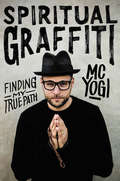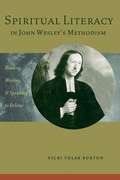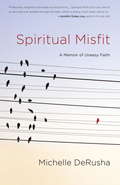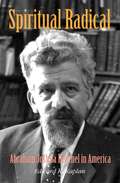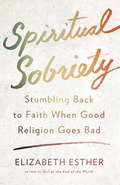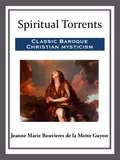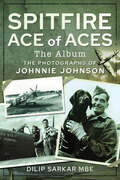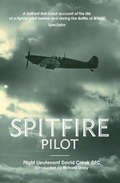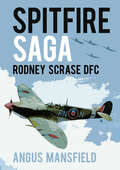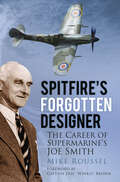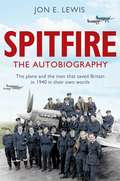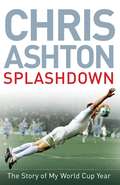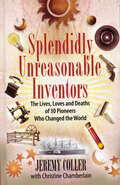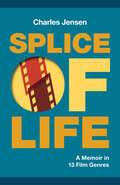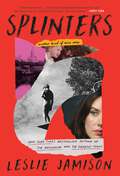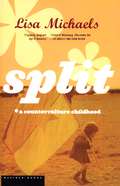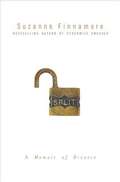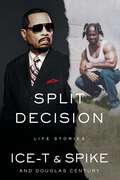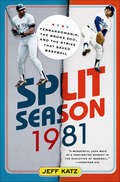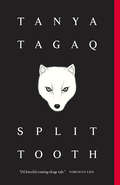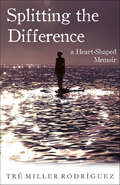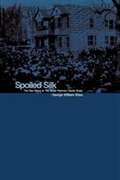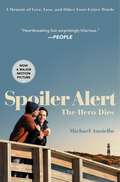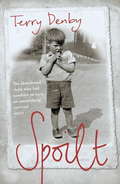- Table View
- List View
Spiritual Graffiti: Finding My True Path
by Mc YogiBefore he was one of the most well-known yoga teachers in North America and an international hip hop artist, MC YOGI was a juvenile delinquent who was kicked out of three schools, sent to live at a group home for at-risk youth, arrested for vandalism, and caught up in a world of drugs, chaos and carelessness. At eighteen, fate brought him to his first yoga class. After discovering yoga, MC YOGI devoted himself to the practice. From traveling to India to study with gurus to living and learning with many American yoga masters, MC YOGI soaked in the knowledge that would revolutionize his entire life and put him on the path to healing, wholeness, and peace. Through technicolor stories of graffiti and guns, mystics and musicians, love, loss, and finding his soul’s purpose, MC YOGI’s journey is saturated in spiritual wisdom, illuminating the potential for transformation within us all.
Spiritual Literacy in John Wesley's Methodism: Reading, Writing, and Speaking to Believe (Studies in Rhetoric and Religion #6)
by Vicki BurtonVicki Tolar Burton argues that John Wesley wanted to make ordinary Methodist men and women readers, writers, and public speakers because he understood the powerful role of language for spiritual formation. His understanding came from his own family and education, from his personal spiritual practices and experiences, and from the evidence he saw in the lives of his followers. By examining the intersections of literacy, rhetoric, and spirituality as they occurred in early British Methodism-and by exploring the meaning of these practices for class and gender-the author provides a new understanding of the method of Methodism.
Spiritual Misfit
by Michelle DerushaI decided to admit once and for all that I didn't know what I was doing, what I thought, what I believed, even sometimes if I truly believed. I would tell the truth: I wasn't like them; I didn't fit in. I wasn't a proper Christian. I didn't have it all together like they did. Why not, I figured? What in the world did I have to lose?_____ After twenty years of unbelief, estranged from her childhood faith and ultimately from God, Michelle DeRusha unexpectedly found herself wrestling hard with questions of spirituality-- and deeply frustrated by the lack of clear answers. Until she realized that the questions themselves paved a way for faith. "Declaring my unbelief," writes DeRusha, "was the first step; declaring my unbelief allowed me to begin to seek authentically." Spiritual Misfit chronicles one woman's journey toward an understanding that belief and doubt can coexist. This poignant and startlingly candid memoir reveals how being honest about our questions, our fears, and our discomfort with black-and-white definitions of faith can move us toward an authentic and a deepening relationship with God.
Spiritual Radical: Abraham Joshua Heschel in America, 1940-1972
by Edward K. KaplanBorn in Warsaw, raised in a Hasidic community, and reaching maturity in secular Jewish Vilna and cosmopolitan Berlin, Abraham Joshua Heschel (1907-1972) escaped Nazism and immigrated to the United States in 1940. This lively and readable book tells the comprehensive story of his life and work in America, his politics and personality, and how he came to influence not only Jewish debate but also wider religious and cultural debates in the postwar decades. A worthy sequel to his widely praised biography of Heschel's early years, Edward Kaplan's new volume draws on previously unseen archives, FBI files, interviews with people who knew Heschel, and analyses of his extensive writings. Kaplan explores Heschel's shy and private side, his spiritual radicalism, and his vehement defense of the Hebrew prophets' ideal of absolute integrity and truth in ethical and political life. Of special interest are Heschel's interfaith activities, including a secret meeting with Pope Paul VI during Vatican II, his commitment to civil rights with Martin Luther King, Jr. , his views on the state of Israel, and his opposition to the Vietnam War. A tireless challenger to spiritual and religious complacency, Heschel stands as a dramatically important witness.
Spiritual Sobriety: Stumbling Back to Faith When Good Religion Goes Bad
by Elizabeth EstherIt's easy to get high on God in America. But is this good religion? In a compelling follow-up to her memoir, Girl at the End of the World, Elizabeth Esther explores how religious fervor can become religious addiction. The evidence is everywhere. In families who inexplicably choose to harm their children in order to abide by cultic church doctrine. But in ordinary believers too who use God the same way addicts use drugs or alcohol--to numb pain, alter their mood, or simply to escape the realities of this messy, unpredictable thing called life. If you've ever wondered how a religion that preaches freedom and love can produce judgmental and unkind followers; if you've ever felt captive to the demanding God of your own childhood; if you've struggled to find contentment without needing another emotional hit from a "life-changing" conference or "mountain-top" experience, then Spiritual Sobriety is for you. The author, who grew up in a hyper-controlling church cult, will help you find hope and rebirth in the ruins of disillusioned faith. Filled with stories and warm, practical advice, Spiritual Sobriety offers a gentle path out of the desperate cycles of craving-euphoria-hangover and into a freer, clean-and-sober faith practice.
Spiritual Torrents
by Jeanne Marie Bouvieres ke la Motte GuyonJeanne-Marie Bouvier de la Motte-Guyon (commonly known as Madame Guyon) was a French mystic and one of the key advocates of Quietism. Quietism was considered heretical by the Roman Catholic Church, and she was imprisoned from 1695 to 1703 after publishing a book on the topic, A Short and Easy Method of Prayer. Guyon believed that one should pray all the time, and that in whatever one does, one should be spending time with God.
Spitfire Ace of Aces: The Photographs of Johnnie Johnson
by Dilip SarkarAir Vice-Marshal James Edgar ‘Johnnie’ Johnson CB, CBE, DSO & Two Bars, DFC & Bar, DL was a character literally from the pages of Boys’ Own: an individual who became the RAF’s top-scoring fighter pilot of the Second World War. A one-time household name synonymous with the superlative Spitfire, Johnnie’s aerial combat successes inspired schoolboys for generations. As a ‘lowly Pilot Officer’, Johnnie Johnson learned his fighter pilot’s craft as a protégé of the legless Tangmere Wing Leader, Douglas Bader. After Bader was brought down over France and captured on 9 August 1941, Johnnie remained a member of 616 (South Yorkshire) Squadron, in which he became a flight commander and was awarded the DFC a month after Bader’s devastating loss. In time, Johnnie came to command a Canadian wing in 1943, when the Spitfire Mk.IX at last outclassed the Fw 190, and participated in some of the most important battles of the defeat of Nazi Germany, including Operation Overlord and the D-Day landings in 1944, Operation Market Garden and the airborne assault at Arnhem, and the Rhine Crossings, throughout all of which Johnnie also commanded Canadian wings. Johnnie’s remarkable career is revealed through this unparalleled collection of archive photographs, the majority of which are drawn from his own personal album or from other members of the Johnson family. Many have not been published before. Between them, they present a fascinating insight into the man himself, the machines he flew, and the men he served alongside.
Spitfire Pilot: A Brilliant First-Hand Account of the Life of a Fighter Pilot Before and During the Battle of Britain
by David Crook Richard Overy“A brilliant first-hand account of the life of a fighter pilot” in World War II (The Spectator). Spitfire Pilot was written in 1940 in the heat of battle, when the RAF stood alone against the might of Hitler’s Third Reich. It is a tremendous personal account of one of the fiercest and most idealized air conflicts—the Battle of Britain—seen through the eyes of a pilot of the famous 609 Squadron, which shot down over one hundred planes in that epic contest. Often hopelessly outnumbered, David Crook and his colleagues, in their state-of-the-art Spitfires, committed acts of unimaginable bravery against the Messerschmitts and the Junkers. Many did not make it—and Crook describes the absence they leave in the squadron with great poignancy. Includes an introduction by historian Richard Overy
Spitfire Saga: Rodney Scrase DFC
by Angus MansfieldRODNEY SCRASE’s life in the RAF began in an old airship shed when he took the King’s shilling in May 1941. He learnt to fly at a British Flying Training School in America and went on to fly Spitfires with Nos 72 and 1 Squadrons, and was awarded the Distinguished Flying Cross in 1944. He was released from service with a record of four enemy aircraft destroyed and three damaged, having taken part in the invasions of North Africa, Sicily and Italy, following up with a stint as an instructor in the art of air-to-air gunnery in Egypt. He finished the war flying escort missions with No. 1 Squadron from Manston, Kent. In Spitfire Saga Angus Mansfield presents the unique story of one man’s experience of flying the most iconic aircraft of the Second World War, using Rodney’s own logbooks and first-hand interviews with him and several other pilots. Complete with thorough historical context and a selection of Rodney’s personal photographs, this book is an excellent addition to any history enthusiast’s library. A true insider’s view of life as an RAF fighter pilot.
Spitfire's Forgotten Designer: The Career of Supermarine's Joe Smith
by Eric Brown Mike RousselThe Supermarine Spitfire was a classic design, well known for its efforts in defending British shores during the Second World War. However, while Reginald Mitchell is rightly celebrated for his original design of the Spitfire, the role of Joe Smith in the development of the Spitfire is often overlooked. Smith was an integral member of the design team from the earliest days, and on Mitchell’s death in 1937 he was appointed design office manager before becoming chief designer. Smith’s dedicated leadership in the development of the Spitfire during the war, as well as his efforts on post-war jet aircraft, deserve their place in history. Charting the fascinating history of Supermarine from 1913 to 1958, when the company ceased its operations in Southampton, shortly after Joe Smith’s death in 1956, this book tells its story through the eyes of apprentices and many other members of Smith’s team. Marvellous photographs add to the sense of what it was like to work under Joe Smith at the drawing boards of one of Britain’s most famous wartime aviation manufacturers.
Spitfire: The Autobiography
by Jon E. LewisA celebration of the machine and the men who took to the skies in defence of Britain. It is also the dramatic illustration of a little understood truth: the Spitfire did more than win the Battle of Britain - it won the war. It was not Stalingrad which turned the corner of the war against Hitler, it was the Spitfire in the summer of 1940 when RAF Fighter Command destroyed the myth of Nazi invincibility.Praise for his previous books:London: The Autobiography:'Fascinating ... brings the story of London to life' Good Book guideThe English Soldier: The Autobiography: 'A triumph' Saul David, author of Victoria's Army'Harrowing, funny and often unbelievable book.' Daily Express'[A] compelling tommy's eye view of war from Agincourt to Iraq' Daily Telegraph
Splashdown: The Story of My World Cup Year
by Chris Ashton<p>From try scoring records to controversial celebrations, Chris Ashton has had an amazing year. Announcing his star presence with an awesome 85-metre try against Australia, Chris burst onto the scene and has lit up Twickenham. <p>In his new book he delves into the England rugby team's renaissance, a victorious Six Nations campaign, the build-up to the Rugby World Cup and the tournament itself in New Zealand. From dynamic tries on the pitch to behind-the-scenes life on tour, this is the story of England's Rugby World Cup journey from the player everyone is talking about.
Splendidly Unreasonable Inventors: The Lives, Loves, and Deaths of 30 Pioneers Who Changed the World
by Jeremy Coller Christine ChamberlainWhy do some inventors succeed and others fail? A private equity pioneer explores personal traits and processes that worked for thirty innovators—or didn’t.Jeremy Coller, a pioneer in the world of private equity, argues that there are three basic personality types in the arena of invention. The Principal, Broker, and Consultant each display certain traits that dictate the potential for success, but few people have the full package. Failure results when an individual who excels in one area of competence attempts to become all things. Thus, even accomplished geniuses can end up penniless.In Splendidly Unreasonable Inventors, Coller focuses on the individual rather than the invention—and explores the ways in which he or she did or did not succeed in bringing their vision to fruition. On one level, the book is a collection of fascinating stories packed with quirky, often humorous nuggets of information. On another level, these stories provide an unconventional look at the processes and personalities that created products that changed the world, including: Jonas Salk and the polio vaccineKing Gillette and the safety razorAlfred Nobel and dynamiteSam Colt and the revolverRudolph Diesel and the diesel engine, and more
Splice of Life: A Memoir in 13 Film Genres
by Charles JensenMovies and memory intersect in this compelling and unconventional memoir from queer writer, film aficionado, and Jeopardy! contestant Charles Jensen.Splice of Life follows Jensen from his upbringing and struggles with sexual awareness in rural Wisconsin to his sexual liberation in college and, finally, to the complex relationships and bizarre coincidences of adulthood. Exploring what it means to be male and queer, each essay splices together Jensen' s lived experiences with his analysis of a single film. Deftly woven, Splice of Life shows us how personal and cultural memory intertwine, as well as how the stories we watch can help us understand the stories we all tell about ourselves.
Splinters: Another Kind of Love Story
by Leslie JamisonFrom the New York Times bestselling author of The Recovering and The Empathy Exams comes &“a blazing, unputdownable memoir&” (Mary Karr, author of Lit), the &“piercing, intimate&” story (TIME Magazine) of rebuilding a life after the end of a marriage—an exploration of motherhood, art, and new love. Leslie Jamison has become one of our most beloved contemporary voices, a scribe of the real, the true, the complex. She has been compared to Joan Didion and Susan Sontag, acclaimed for her powerful thinking, deep feeling, and electric prose. But while Jamison has never shied away from challenging material—scouring her own psyche and digging into our most unanswerable questions across four books—Splinters enters a new realm. In her first memoir, Jamison turns her unrivaled powers of perception on some of the most intimate relationships of her life: her consuming love for her young daughter, a ruptured marriage once swollen with hope, and the shaping legacy of her own parents&’ complicated bond. In examining what it means for a woman to be many things at once—a mother, an artist, a teacher, a lover—Jamison places the magical and the mundane side by side in surprising ways. The result is a work of nonfiction like no other, an almost impossibly deep reckoning with the muchness of life and art, and a book that grieves the departure of one love even as it celebrates the arrival of another. How do we move forward into joy when we are haunted by loss? How do we claim hope alongside the harm we&’ve caused? A memoir for which the very term tour de force seems to have been coined, Splinters plumbs these and other pressing questions with writing that is revelatory to the last page, full of linguistic daring and emotional acuity. Jamison, a master of nonfiction, evinces once again her ability to &“stitch together the intellectual and the emotional with the finesse of a crackerjack surgeon&” (NPR).
Split
by Lisa MichaelsIn Split, Lisa Michaels offers a strikingly textured portrait of her days of communes and road trips, of antiwar protests and rallies --- and of what came after, for her parents and herself --- as the radicalism of the 1960s and '70s gave way to conservative times. As a young child, Michaels visited her father in prison, where he was serving a two-year sentence for his part in an antiwar protest. In the early '70s, she toured the country with her mother and stepfather in a customized mail truck, complete with oriental rugs and a wood stove, until the family settled in a small northern California town. Her father later moved to the Bay Area, where he worked in auto plants and served as a labor organizer. By the age of eight Michaels was a veteran leaflet-folder, and she consecrated her father's second marriage in a Berkeley park by reading from Quotations from Chairman Mao. Not surprisingly, Michaels grew up craving conformity --- giving her mother makeovers and arranging their secondhand furniture in inspired ways --- but she also came to share the values her parents held dear: independence, frankness, and unsparing self-examination. In the buttoned-up world of UCLA during the Reagan years, she went through a hippie revival phase, wearing batik dresses and Chairman Mao pins, a throwback amid the campus's Greek revivalists and young Republicans. Against that traditional backdrop her parents' longtime activism took on new meaning, and at twenty-two, much in the spirit of her upbringing, Michaels embarked on a trip through Asia. Observant, luminous, and wry, Split captures both the vulnerability and heady freedom of a counterculture childhood. It is a powerful blend of social reflection and personal reminiscence, a memoir that paints a clear-eyed and unforgettable picture of the ways in which the legacy of the '60s impacted one remarkable family.
Split
by Suzanne Finnamore?Not only funny, it?s also fully triumphant. . . a heartbreaking pleasure to read. ?(Elle) Suzanne Finnamore didn?t see it coming. Well, she saw some things?for example, a cocktail napkin on which her husband had scribbled a Cole Porter love song and an indecipherable name?but she refused to acknowledge it. She was busy tending to their son and creating the perfect home. Until the night it all imploded. ?I deserve happiness,? he said, which apparently translated into ousting her from his life. At once funny, sad, and unflinchingly fierce, this memoir will resonate with anyone who has endured the end of a relationship?and come out on the other side changed. .
Split Decision: Life Stories
by Douglas Century Ice-T SpikeAward-winning actor, rapper, and producer Ice-T unveils a compelling and astonishing memoir of his early life robbing jewelry stores until he found fame and fortune—while a handful of bad choices sent his former crime partner down an incredibly different path. Ice-T rose to fame in the late 1980s, earning acclaim for his music before going on to capture television audiences as Odafin &“Fin&” Tutuola in Law & Order: Special Victims Unit. But it could have gone much differently. In this gripping and candid memoir, Ice-T and Spike, his former crime partner—collaborating with New York Times bestselling author Douglas Century—relate the shocking stories of their shared pasts, and how just a handful of decisions led to their incredibly different lives. Both grew up in violent, gang-controlled Los Angeles neighborhoods and worked together to orchestrate a series of jewelry heists in LA and across the US. But while Ice-T was discovered rapping in a club and got his first record deal, Spike was caught for a jewel robbery and did three years in prison. As his music career began to take off, Ice made the decision to leave the criminal life; Spike continued to plan increasingly ingenious and risky jewel heists. And in 1992, after one of Spike&’s robberies ended tragically, he was sentenced to thirty-five years to life. While he sat behind bars, he watched his former partner rise to fame in music, movies, and television. Harrowing, timely, and thoughtful, two men with two very different lives reveal how their paths might have very well been reversed if they made different choices. All it took was a Split Decision.
Split Season 1981: Fernandomania, the Bronx Zoo, and the Strike that Saved Baseball
by Jeff KatzThe never-before-told story of the momentous season torn in half by the bitter players strike. Sourcing incredible and extensive interviews with almost all of the major participants in the strike, Split Season: 1981 returns us to the on- and off-field drama of an unforgettable baseball year. 1981 was a watershed moment in American sports, when players turned an oligarchy of owners into a game where they had a real voice. Midway through the season, a game-changing strike ripped baseball apart, the first time a season had ever been stopped in the middle because of a strike. Marvin Miller and the MLB Players Association squared off against Baseball Commissioner Bowie Kuhn and the owners in a fight to protect players rights to free agency and defend America's pastime.Though a time bomb was ticking as the 1981 season began, the game rose to impressive---and now legendary---heights. Pete Rose chased Stan Musial's National League hit record and rookie Fernando Valenzuela was creating a sensation as the best pitcher in the majors when the stadiums went dark and the players went on strike.For the first time in modern history, there were first- and second-half champions; the two teams with the overall best records in the National League were not awarded play-off berths. When the season resumed after an absence of 712 games, Rose's resumption of his pursuit, the resurgence of Reggie Jackson, the rise of the Montreal Expos, and a Nolan Ryan no-hitter became notable events. The Dodgers bested their longtime rivals in a Yankees-Dodgers World Series, the last classic matchup of those storied opponents.
Split Tooth
by Tanya TagaqLonglisted for the 2018 Scotiabank Giller PrizeFrom the internationally acclaimed Inuit throat singer who has dazzled and enthralled the world with music it had never heard before, a fierce, tender, heartbreaking story unlike anything you've ever read.Fact can be as strange as fiction. It can also be as dark, as violent, as rapturous. In the end, there may be no difference between them.A girl grows up in Nunavut in the 1970s. She knows joy, and friendship, and parents' love. She knows boredom, and listlessness, and bullying. She knows the tedium of the everyday world, and the raw, amoral power of the ice and sky, the seductive energy of the animal world. She knows the ravages of alcohol, and violence at the hands of those she should be able to trust. She sees the spirits that surround her, and the immense power that dwarfs all of us. When she becomes pregnant, she must navigate all this.Veering back and forth between the grittiest features of a small arctic town, the electrifying proximity of the world of animals, and ravishing world of myth, Tanya Tagaq explores a world where the distinctions between good and evil, animal and human, victim and transgressor, real and imagined lose their meaning, but the guiding power of love remains.Haunting, brooding, exhilarating, and tender all at once, Tagaq moves effortlessly between fiction and memoir, myth and reality, poetry and prose, and conjures a world and a heroine readers will never forget.
Splitting the Difference: A Heart-Shaped Memoir
by Tré Miller RodriguezAt 18, Tré Miller-Rodríguez gave her newborn daughter up for adoption. At 19, her only sibling was killed in a car crash. At 34, she lost her husband to a sudden heart attack. Then, at 36, her now-teenaged daughter found her on Facebook—and began to reshape the course of Tré’s life. With sharp, immediate prose, Tré unpacks the experience of being young and widowed in New York City: the “dumb sh*% people say”; the “brave face” she wears to work and social events; the solace she doesn’t find in one-night stands; and how her perspective only begins to shift when she spontaneously brings Alberto’s ashes on a trip and sets into motion the ritual of spreading him in bodies of water around the world. Once she’s begun, Tré discovers that traveling to her bucket list destinations—places like Savannah, Brazil, and Cuba—is a viable strategy for facing her roughest days, and her loss of her husband becomes a lens through which she begins to view her past and embrace her future. By the end of her journey, Tré has quit her corporate job, explored Alberto’s homeland of Cuba, and joyfully reunited with her biological daughter in North Carolina. Equal parts inspiring, irreverent, and heart-rending, Splitting the Difference is written with the “raw-thenticity” of a woman transformed by heartbreak and inspired by love’s legacy.
Spoiled Silk: The Red Mayor and the Great Paterson Textile Strike
by George William SheaSpoiled Silk is the story of two immigrants from the Rhineland, William Brueckmann and his wife Katherine, who started a new life in America's first industrial city, Paterson NJ, nourishing a vision of their adopted country that was never to be. Committed to a socialist dream, they struggled to improve the lot of their fellow immigrants and, at the same time, to raise a family in the midst of the turbulence that surrounded them. Their efforts contributed in the long run to improved working conditions in American mills, but their dream of a socialist America was never to be realized. It was in 1913 that the workers in the Paterson textile mills, having learned that a new kind of loom would put many of them out of work went on strike against the mill owners. In desperation, they called in Big Bill Haywood and the Wobblies of the I. W. W. to help them. The Paterson authorities moved quickly to crush the strike by forbidding the strikers to hold public meetings. Alone among elected local officials, William Brueckmann, Mayor of the neighboring town of Haledon, defied the Paterson authorities and their police department and upheld the constitutional rights of the strikers by giving them a safe haven in his town. His action marked the beginning of a long and bitter struggle that brought thousands of workers to the open fields of Haledon and forced the city of Paterson to its knees. The strike is an important chapter in the history of the American labor movement. For William and Katherine Brueckmann it did not however, mark the end of their struggles. Spoiled Silk also chronicles the prejudice they had to face during the First World War and the pressures that eventually drove them to compromise with post-war America and its Good Times. It was a compromise that would bring with it a different kind of tragedy and sorrow, the death of an only son and their own drawing apart from one another. The recent interest in immigrants to America has almost overlooked the largest group of immigrants, the German Americans. Spoiled Silk is a moving story about two of them. Vividly told by their grandson, who draws upon a reservoir of family stories as well as official sources, Spoiled Silk brings to life the experiences of these valiant people in the early decades of the century just past.
Spoiler Alert: A Memoir of Love, Loss, and Other Four-Letter Words
by Michael AusielloIn this evocative and gorgeously wrought memoir reminiscent of Rob Sheffield’s Love Is a Mixtape and George Hodgman’s Bettyville, Michael Ausiello—a respected TV columnist and founder and editor-in-chief of TVLine.com—remembers his late husband, and the lessons, love, and laughter that they shared throughout their fourteen years together.For the past decade, TV fans of all stripes have counted upon Michael Ausiello’s insider knowledge to get the scoop on their favorite shows and stars. From his time at Soaps in Depth to his influential stints at TV Guide and Entertainment Weekly to his current role as founder and editor-in-chief of the wildly popular website TVLine.com, Michael has established himself as the go-to expert when it comes to our most popular form of entertainment. What many of his fans don’t know, however, is that while his professional life was in full swing, Michael had to endure the greatest of personal tragedies: his husband, Kit Cowan, was diagnosed with a rare and very aggressive form of neuroendocrine cancer. Over the course of eleven months, Kit and Michael did their best to combat the deadly disease, but Kit succumbed to his illness in February 2015. In this heartbreaking and darkly hilarious memoir, Michael tells the story of his harrowing and challenging last year with Kit while revisiting the thirteen years that preceded it, and how the undeniably powerful bond between him and Kit carried them through all manner of difficulty—always with laughter front and center in their relationship. Instead of a tale of sadness and loss, Spoiler Alert: The Hero Dies is an unforgettable, inspiring, and beautiful testament to the resilience and strength of true love.
Spoilt: The abandoned child who had nowhere to turn - an astonishing survival story
by Terry DenbyIn the coming weeks and months I was further humiliated by Auntie Blodwen. The beatings were usually around the head or on the back of the legs, the arms or bare bottom. Auntie Agnes would hold me down in the office, the cloakroom, or in the cellar, while Auntie Blodwen laid into me. I was now totally exposed to the wilfulness and madness of these adults . . . I was in care. Terry begins life on an estate in East London known as 'The Buildings'. Rarely attending school, he wanders the streets for hours, collecting cigarette butts while his mother entertains men and sings in local pubs. But when he returns to find the 'welfare' on his door, he realises his troubles have only just begun . . . His mother gives him up without a fight and Terry finds himself in a care home run by the tyrannical Auntie Blodwen. Terry is brutally beaten on a regular basis and shut for hours in the coal cellar. His only strength gleaned from the children who share this nightmare, and his friendship with his guardian's dog, Jenny. Denied all the opportunities children so desperately need, Terry's story builds a picture of a bewildered and deeply troubled child who is let down time and time again by the very people he needs the most. But this powerful memoir shows how even the most deprived child can make their own luck and eventually find happiness.
Spoilt: The abandoned child who had nowhere to turn - an astonishing survival story
by Terry DenbyIn the coming weeks and months I was further humiliated by Auntie Blodwen. The beatings were usually around the head or on the back of the legs, the arms or bare bottom. Auntie Agnes would hold me down in the office, the cloakroom, or in the cellar, while Auntie Blodwen laid into me. I was now totally exposed to the wilfulness and madness of these adults . . . I was in care. Terry begins life on an estate in East London known as 'The Buildings'. Rarely attending school, he wanders the streets for hours, collecting cigarette butts while his mother entertains men and sings in local pubs. But when he returns to find the 'welfare' on his door, he realises his troubles have only just begun . . . His mother gives him up without a fight and Terry finds himself in a care home run by the tyrannical Auntie Blodwen. Terry is brutally beaten on a regular basis and shut for hours in the coal cellar. His only strength gleaned from the children who share this nightmare, and his friendship with his guardian's dog, Jenny. Denied all the opportunities children so desperately need, Terry's story builds a picture of a bewildered and deeply troubled child who is let down time and time again by the very people he needs the most. But this powerful memoir shows how even the most deprived child can make their own luck and eventually find happiness.
